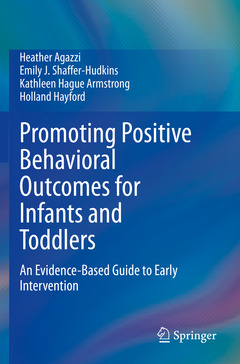Description
Promoting Positive Behavioral Outcomes for Infants and Toddlers, 1st ed. 2020
An Evidence-Based Guide to Early Intervention
Authors: Agazzi Heather, Shaffer-Hudkins Emily J., Armstrong Kathleen Hague, Hayford Holland
Language: English
Subjects for Promoting Positive Behavioral Outcomes for Infants and...:
Keywords
Adaptive behaviors in infants and toddlers; Attachment theory and early childhood development; Cognitive skills in infants and toddlers; Communication skills of infants and toddlers; Differential attention in infants and toddlers; Early intervention for infants and toddlers; Early interventions for behavioral problems; Externalizing behaviors of infants and toddlers; Home visitation and positive behavioral development; Individual Growth and Developmental Indicators (IGDIs); Internalizing behaviors of infants and toddlers; Intervention implementation and evaluation; Language development in infants and toddlers; Motor development in infants and toddlers; Parenting styles and early childhood development; Primary prevention and early childhood development; Punishment and early childhood development; Risk factors for problem behaviors in early childhood; Secondary prevention and intervention in early childhood; Social and emotional development of infants and toddlers
137.14 €
In Print (Delivery period: 15 days).
Add to cartPublication date: 10-2021
154 p. · 15.5x23.5 cm · Paperback
137.14 €
In Print (Delivery period: 15 days).
Add to cartPublication date: 10-2020
154 p. · 15.5x23.5 cm · Hardback
Description
/li>Contents
/li>Biography
/li>Comment
/li>
Describes how infants and toddlers learn from a behavioral perspective
Presents tools for developmental screening, assessment, and progress monitoring
Examines strategies for reducing challenging behaviors in young children
Provides a guide for creating family- and child-centered individualized treatment plans
Offer strategies for working with families challenged by cultural differences, poverty, and mental health issues




